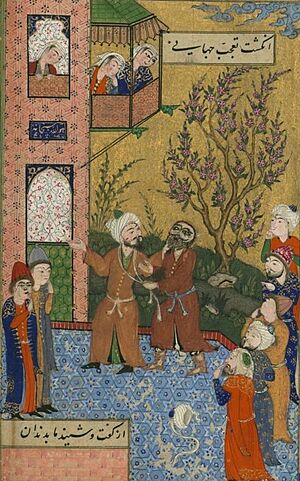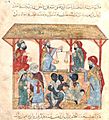Sharia facts for kids
Sharia, also known as Islamic law, is a set of religious rules that are part of the Islamic way of life. The Arabic word sharīʿah means "way" or "path" and refers to God's revealed law.
Classical sharia covers many parts of public and private life. This includes religious practices, family matters, business, and even rules for warfare. In the past, religious scholars called jurists interpreted sharia. They based their opinions on the Qur'an, the Hadith (sayings and actions of Prophet Muhammad), and many years of discussions and past decisions.
Some parts of sharia are like laws we know today. Other parts are more like guidelines for living a life that follows God's will.
Today, most countries with a Muslim population have their own laws. Only a small part of their legal systems is based on classical sharia. Muslims sometimes have different ideas about how sharia should be used in the modern world.
Contents
Understanding Classical Islamic Law
How Scholars Interpreted Sharia
Early Islamic scholars created different ways to understand sharia. Most of them agreed that sharia rules should come from four main sources:
- The Qur'an: Muslims believe this book was revealed by God to Prophet Muhammad through the angel Gabriel.
- The sunnah: These are the actions and words of Prophet Muhammad. They are collected in books called hadith.
- Consensus: This is when many legal experts agree on a specific rule or point of law.
- Qiyās: This means using logical reasoning by comparing new situations to known rules.
The process of finding sharia rules from the Qur'an and hadith is called ijtihad. This is how scholars work to understand and apply the divine law.
Categories of Actions in Islam
Sharia rules help classify different actions into five main groups:
- Fard: Actions that Muslims must do (like daily prayers).
- Mustahabb: Actions that are recommended or good to do (like giving extra charity).
- Mubah: Actions that are allowed or neutral (like choosing what to eat).
- Makruh: Actions that are disliked or frowned upon (like wasting food).
- Haram: Actions that are forbidden (like stealing).
Muslims see sharia as God's revealed law, which cannot be changed. However, the way scholars interpret sharia is called fiqh. Scholars have often had different opinions on these interpretations.
There are several important schools of legal thought in Islam. The main ones for Sunni Islam are the Hanafi, Maliki, Shafi'i, and Hanbali schools. For Shia Islam, the Ja'fari school is the most important. These schools offer different ways of understanding and applying sharia.
Images for kids
-
Coin from the Rashidun Caliphate (dated 656 AD).
-
A discussion between scholars Abu Dawud and Ahmad ibn Hanbal from an old manuscript (dated 879 AD).
-
Warren Hastings began legal changes in British India.
-
Muhammad Abduh, an influential reformist thinker.
See also
 In Spanish: Sharía para niños
In Spanish: Sharía para niños
















